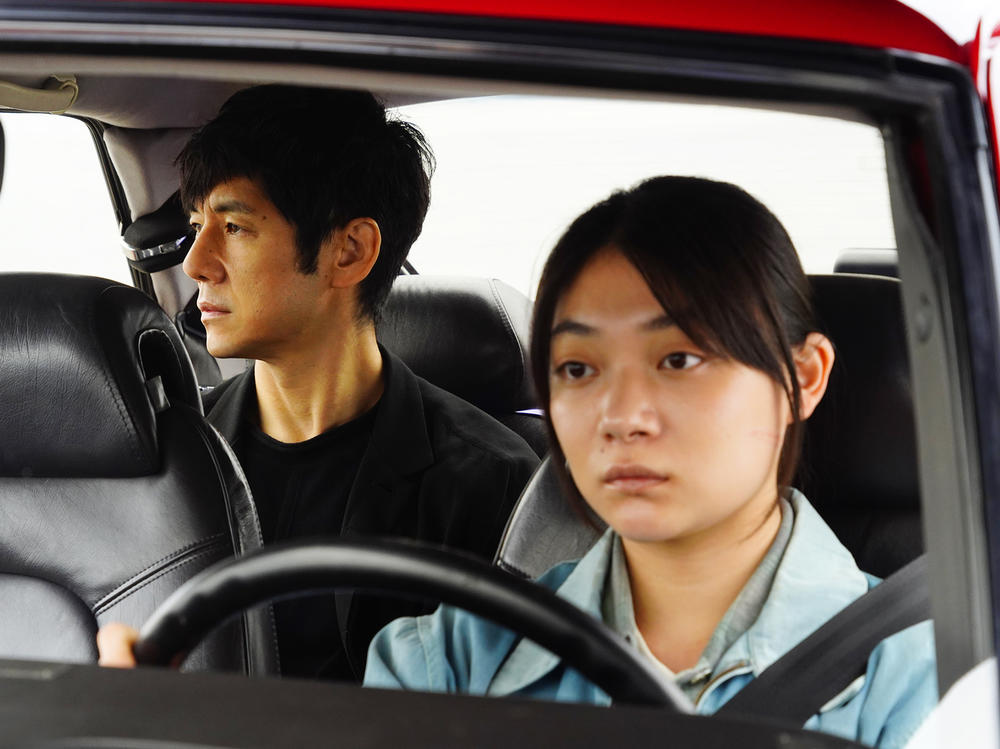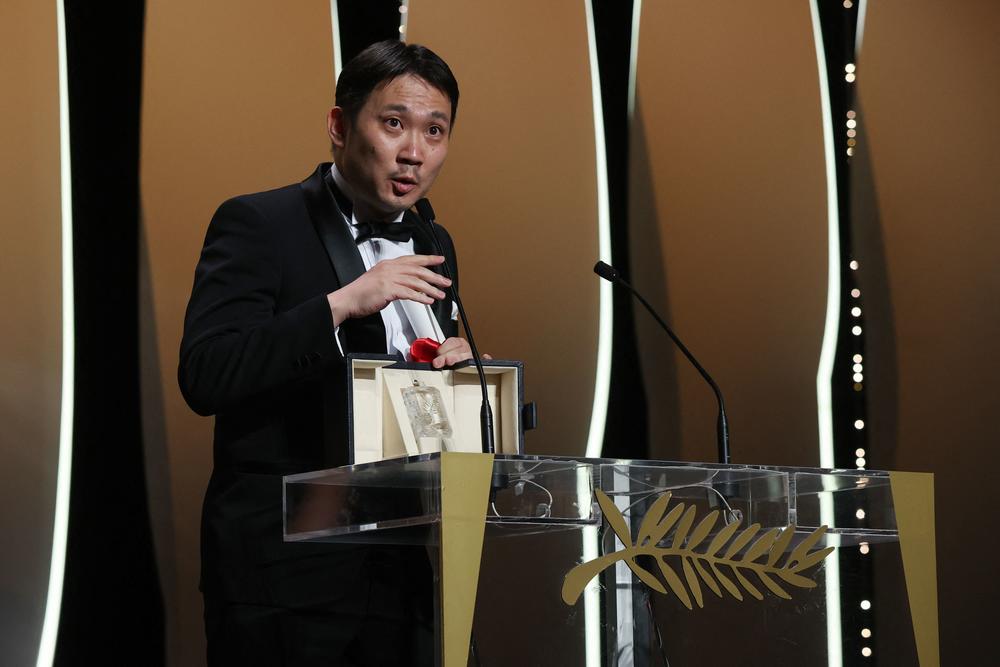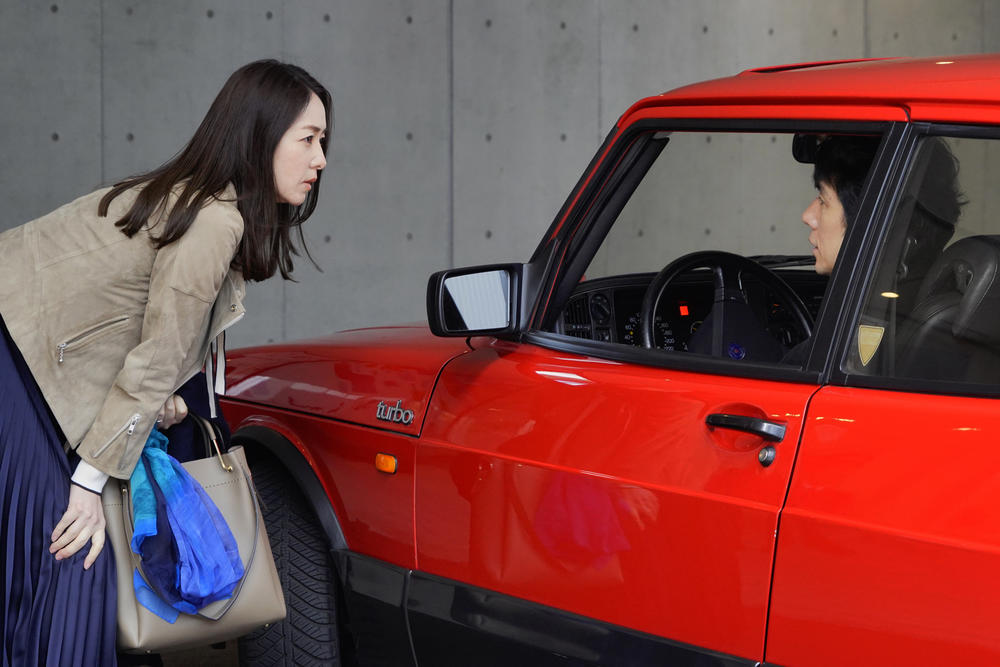Section Branding
Header Content
Japan's Oscar-nominated 'Drive My Car' is a journey through loss, grief and art
Primary Content
SEOUL — Japanese cinema scored a milestone this week, as the film Drive My Car became the country's first to be nominated for best picture at the Academy Awards. If it wins, it will become the second foreign-language film with that honor; the first was Parasite, directed by South Korea's Bong Joon-ho, in 2020.
Drive My Car — adapted from a 2014 short story by Haruki Murakami, one of Japan's most celebrated authors — also picked up nominations for best director, best international feature and best adapted screenplay.
The film is directed by Ryusuke Hamaguchi, who dramatizes some of Murakami's trademark themes: loss, guilt and the interplay of art and life. Hamaguchi is the first Japanese director to be nominated since Akira Kurosawa in 1986.
Drive My Car starts with the story of theater actor and director Yusuke Kafuku, and his screenwriter wife Oto, who are trying to heal following the death of their young child by telling stories, which they make up during and after sex.
Kafuku's calm exterior masks his inner torment. He is baffled and devastated to find out that Oto has been sleeping with a string of young actors. But she doesn't know that he knows.
"My character is a person who loves and understands his wife more than anybody," actor Hidetoshi Nishijima, who plays Kafuku, explains. "You think you understand each other better and trust each other more than anyone. But still, there is a place in the heart that you cannot reach, or understand."
Oto, played by Reika Kirishima, hints that she's ready to own up to her infidelity, but dies before she can do so. From there, the action fast-forwards two years, and the main part of the story begins.
The film's characters struggle to come to terms with guilt and grief
Drive My Car is a complex, layered, three-hour movie adapted from a short story that Hamaguchi says is actually "a big story, of which only little bits are shown, and other parts are hidden." His task, he says, was to reveal the hidden parts, "like excavating ruins."
Hamaguchi focuses in particular in revealing the characters' emotions. "The camera has X-ray eyes, and it can even film a person's soul. I never used to believe it," he says. But as he worked on the film, he gradually came to see it that way and hopes the film's viewers will too.
After Oto's death, Kafuku copes with his pain through acting — by becoming someone else. Among the roles Kafuku plays is the lead in Uncle Vanya, Anton Chekhov's play about the frustrated caretaker of a Russian country estate.
"Chekhov is terrifying," Kafuku says in the film, because "when you say his lines, it drags out the real you."
He has a breakdown and switches from acting to directing.
The car of the movie title — an old, red two-door Saab sedan — is Kafuku's mobile stage, and also serves as a shrine to his wife. With a cassette recording of Oto reading the other parts, Kafuku practices his lines in the car as he heads to the theater or glides along expressways, and later makes some long road trips.
He accepts a directing residency for Uncle Vanya from a Hiroshima theater, but one of the conditions for his employment is to have a driver, since he has glaucoma and a DUI conviction. He's assigned a young female driver named Misaki, and has a hard time handing over the keys.
Toko Miura, who plays Misaki, says that underneath her tough exterior is an honest and empathetic character.
"She says she is sensitive to when people are lying. I think that means she can understand people's feelings," Miura says. "In many ways, I wanted to be like her."
In the Saab, Kafuku and Misaki gradually open up to each other and discover common feelings of loss and guilt. Kafuku later observes that Misaki's driving is so smooth, he feels weightless and forgets he's in a car.
In Hiroshima, Kafuku casts an inexperienced young actor — who happens to be his late wife's former lover. Nishijima, the actor playing Kafuku, suggests that his character casts that young actor as a kind of revenge.
"I think he gave the role to the actor out of a feeling which was rather dark, unclear and deep," he says. "As I was acting this scene, I had such an indescribable feeling."
But the bereaved husband and the younger man begin to open up to each other about their relationships with Oto. In fact, both reveal facets of her that the other had not known.
The multilingual play within the movie reflects Murakami's universality
The multilingual version of Uncle Vanya that Kafuku directs employs a cast of international actors who deliver their lines in their native languages, including Japanese, Korean, Chinese, Tagalog and Bahasa Indonesia.
This is one way in which Hamaguchi brings to life Murakami's writing, which transcends language and nationality, says Matthew Strecher, a modern Japanese literature professor at Sophia University in Tokyo.
Murakami "does it through his writing style, writing this incredibly translatable Japanese," Strecher says. "And he does it by setting his stories in places where it could be anyplace."
While South Korean and Taiwanese actresses are rehearsing dialogue from Uncle Vanya, Kafuku tells them: stop, something important just happened.
The acting transcends the play, appearing as a conversation between two people rather than actors delivering their lines. Kafuku then tells the actors to extend that conversation to the audience.
"To me, that was like one of several really big moments in this film," Strecher says, "because that was the moment when the barrier between reality and fiction broke down, which is something that's always happening."
When that barrier breaks down, the effect can be to blur the distinction between actors and audience, as if they are talking to you directly rather than acting in a play.
"But I think that's true with all Murakami writing," Strecher adds. "You go through the story and then you end up rewriting the story anyway in your own image and discovering that it's also about you — because all of his stories deal with stuff that we all deal with."
The characters in Drive My Car eventually arrive at some catharsis and relief from sharing their common feelings of loss. But ultimately, there are no easy answers to life's problems. As the characters in Uncle Vanya conclude, all people can do is go on living as best they can, says Strecher.
Which perhaps is why Drive My Car ends ambiguously, summed up on Misaki's face with just a faint hint of a smile.
Chie Kobayashi contributed to this report from Tokyo.
Copyright 2022 NPR. To see more, visit https://www.npr.org.



